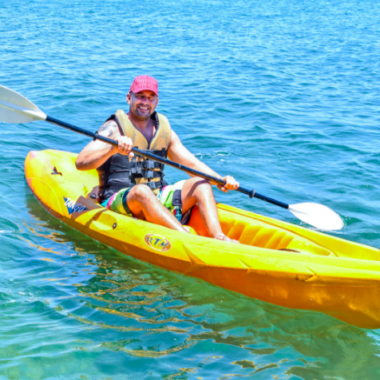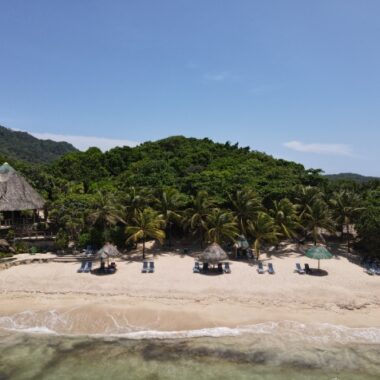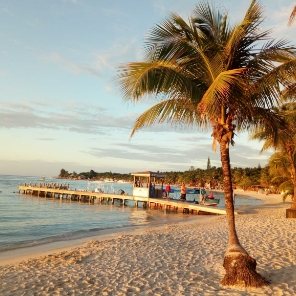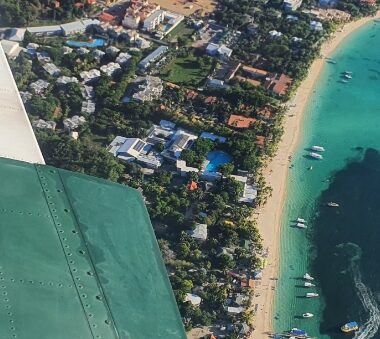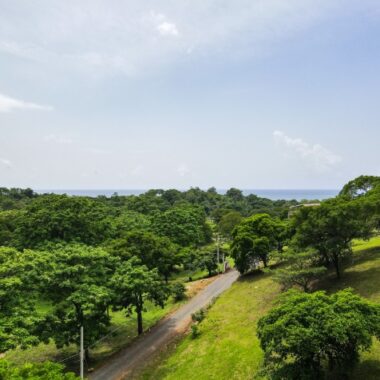All about the island of Roatán
Roatán is a beautiful place for recreation or year-round living. Want to learn more about the island? We have prepared a brief guide for you.

Everything you need to know about Roatán
We have prepared an overview page with all the information you need, which we are constantly updating and adding new information. Here you will find everything you need to know about the island of Roatán and much more.
Where is Roatán?
Roatán is the largest island of the Bay Islands archipelago (Islas de la Bahía), located in the Caribbean Sea, about 65 kilometres north of the coast of Honduras. The island is approximately 77 kilometres long and 8 kilometres wide. Roatán is famous for its coral reef, which is part of the Mesoamerican Barrier Reef, the second largest coral system in the world. This location particularly attracts divers and snorkelers from all over the world. Roatán is easily accessible by air, with Juan Manuel Gálvez International Airport receiving flights from the USA, Canada and Latin America.
What is the weather like in Roatán?
Roatán has a tropical climate, characterised by warm temperatures throughout the year. Average daily temperatures range between 25 and 30 °C, with humidity often reaching 80-90%. The island has two main seasons – dry and rainy. The dry season runs from February to May, while the rainy season comes between October and January, with November usually being the rainiest month. Even in the rainy season, days are often sunny and showers are short, making Roatán an attractive destination all year round. The Caribbean Sea ensures that the water temperature stays around 27-29°C, making it ideal for swimming, diving and other water activities.
What are the main tourist attractions in Roatán?
Roatán is primarily known for its stunning coral reef, making it one of the most popular diving and snorkelling destinations in the world. Besides the reef, there are other natural beauties and attractions:
Ziplining and trekking.The island also offers many adventure activities such as ziplining in the jungle, trekking along the trails or visiting the caves.
Diving and snorkelling: the coral reefs around Roatán are home to thousands of species of fish, turtles, dolphins and other marine animals. Many dive centres offer courses for beginners and advanced divers.
West Bay Beach: one of the most beautiful beaches on the island, famous for its white sandy beach and calm turquoise sea. It is ideal for relaxing, swimming and snorkelling.
Gumbalimba Park. You can see tropical plants, meet monkeys, parrots and even swim with dolphins.
Roatan Institute for Marine Sciences (RIMS): Here you can learn more about marine life conservation and the coral reef ecosystem.
What are the accommodation options on Roatan?
Roatan offers a wide range of accommodation, from budget hostels to luxury resorts. Accommodation can be found mainly in the West End and West Bay areas, where there are the nicest beaches and plenty of restaurants, bars and activities. As well as traditional hotels and resorts, you can also find private villas and apartments, which are popular with families and larger groups.
Is Roatán safe for tourists?
Roatán is considered a relatively safe destination for tourists. However, like any tourist spot, it is important to follow basic safety precautions such as keeping a close eye on personal belongings and avoiding deserted or poorly lit areas at night. Tourist areas such as the West End and West Bay are well protected by the police and have low crime rates. Outside of these areas it is wise to be vigilant, especially if you are travelling to less visited parts of the island. The island is also relatively calm in terms of natural disasters, although there is a small risk of hurricanes during hurricane season (June to November).
What are the transport options on Roatán?
There are several easy ways to get around Roatán:
- Rent a car: car rentals are available, which can be a convenient way to explore the island on your own. The roads are relatively good, especially in the tourist areas.
- Taxi: Taxi service is common and affordable on the island. Most taxis do not have meters, so it is advisable to agree on a price in advance.
- Water taxis: There is also a water taxi service between the West End and West Bay, which is a popular mode of transportation for tourists.
- Local buses and minivans: For cheaper travel options, you can use the local buses and minivans that connect the main parts of the island.
What is the local language and currency on Roatán?
The official language in Roatán is Spanish, but English is widely spoken, especially in tourist areas, as the island has historical links to the British colonial period. Many locals are fluent in both languages. In terms of currency, the official currency is the Honduran Lempira (HNL), but US dollars are widely accepted, especially in tourist areas. You can pay with cash or card, but in more remote places it is advisable to have plenty of cash as not everywhere accepts cards.
- What are the health conditions in Roatán?
There are several medical facilities on Roatán, including private clinics and hospitals that provide basic health care. However, major health problems may require travel to mainland Honduras or another country. It is recommended for travelers to have travel insurance that covers medical evacuation in the event of a serious health problem. Tap water is not recommended for drinking, so it is better to drink bottled water. In areas with jungles or swamps, it is important to use mosquito repellent, especially during the rainy season when insect-borne diseases such as dengue fever can occur.
Do you have any questions?
We have the answers
What’s behind life in the Caribbean? And is this life really for you? Get in touch with us or read our blog where we detail the entire journey. From your first contact with a developer to life on the island of Roatán.

